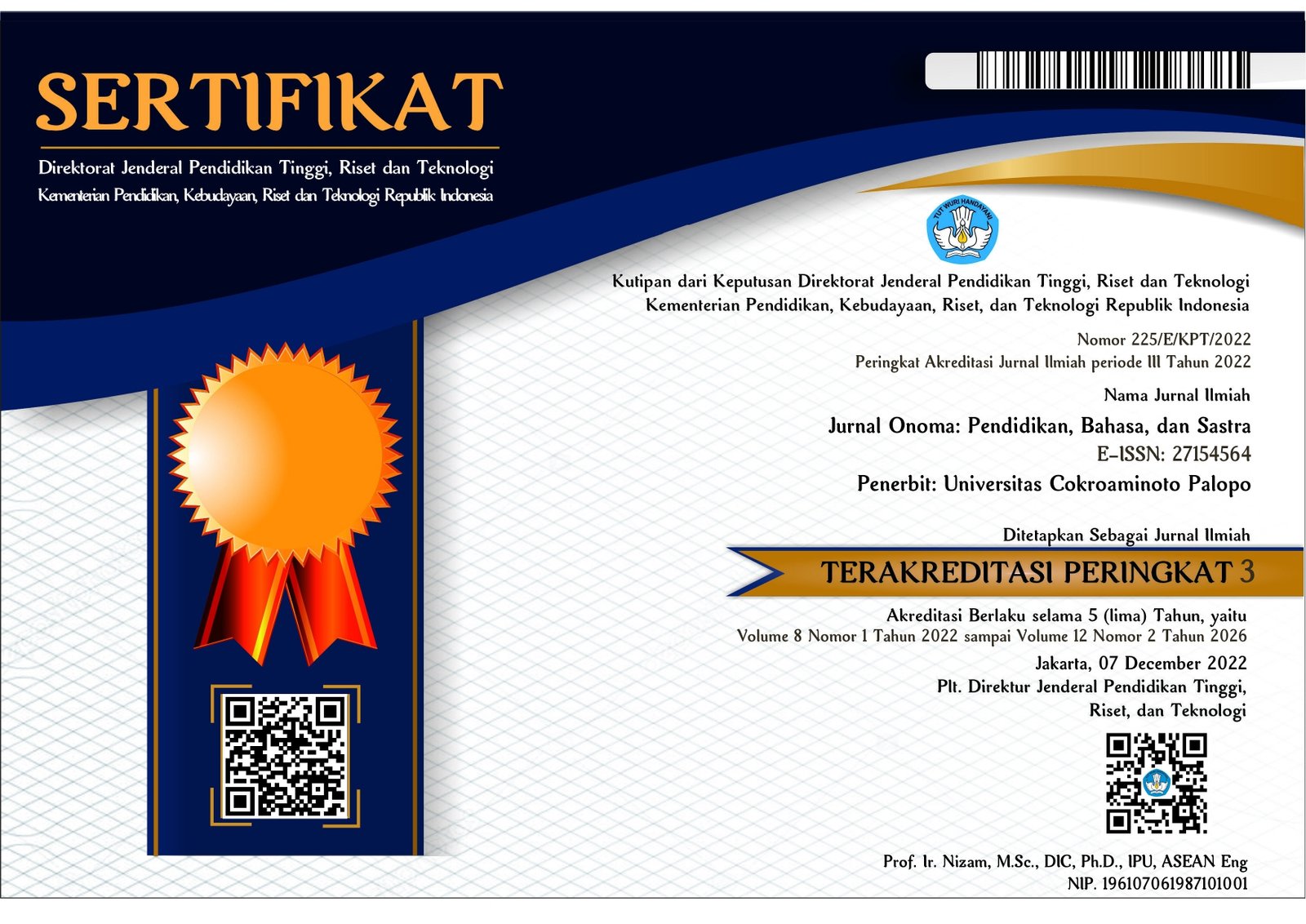Pembelajaran Kolaboratif Jumping Tasks pada Materi “Macam-Macam Pekerjaan” Siswa Kelompok B1 Paud Santo Yoseph Kota Ternate
https://doi.org/10.30605/onoma.v6i2.376
Keywords:
KKolaboratif, Jumping TaskAbstract
Jumping tasks merupakan aktivitas pembelajaran dengan pemberian masalah berdasarkan tingkat kesulitanyang lebih tinggi untuk meningkatkankemampuan siswa.Penelitian ini bertujuan untuk mendeskripsikan kegiatan pembelajaran kolaboratif jumping tasks pada materi ‘Macam-macam Pekerjaan’ di kelompok B PAUD Santo Yoseph Kota Ternate. Teknik pengumpulan data dilakukan dengan metode observasi dan dokumenter.Analisis data kualitatif menggunakan model interaksi Miles and Huberman.Rata-rata hasil penelitian menunjukkan bahwa pembelajaran kolaboratif jumping task pada materi ‘Macam-Macam Pekerjaan’ di kelompok B1 PAUD Santo Yoseph Ternate sebesar 46,15%siswa yang dapat menyelesaikan dengan kategori berkembang sesuai harapan dan sangat baik, namun 53,85% siswa belum dapat menyelesaikan secara tuntas (masih dalam tahap mulai berkembang). Disarankan bahwa guru perlu membiasakan siswa untuk mengembangkan pola berpikir tingkat tinggi dengan memberikan tantangan (jumping task) sehingga siswa terbiasa untuk mengembangkan kemampuan berpikir dalam menyelesaikan masalah yang diberikan guru.
Downloads
References
Gifford, M.C. & Arvin, A. (2009).Sharing in teams of heterogeneous, collaborative learning agents. International Journal Of Intelligent Systems. 24. hlm. 173- 200
Kirschner Femke , Fred Paas and Paul A. Kirschner1, 2011. Task Complexity As A Driver For Collaborative Learning, http:// citeseerx.ist.psu.edu/ viewdoc/download?doi=10.1.1.1027.5111&rep=rep1&type=pdf, diakses 13 juli 2019
Khotimah, R.P. & Masduki. (2016). Improving Teaching Quality and Problem Solving Ability through Contextual Teaching and Learning in Differential Equations: A Lesson Study Approach. Journal of Research and Advances in Mathematics Education. 1(1), 1-13. http://journals.ums.ac.id/index.php/jramathedu.
Lewis, Catherine. C., Lesson study: A Handbook of Teacher-Led Instructional Change. Philadelphia, PA: Research for Better Schools, Inc, 2002.
Manabu Sato, .2014. Mereformasi sekolah: konsep dan praktek komunitas belajar. Tokyo: Pelita.
Masaaki, Sato (2012). Dialog dan Kolaborasi di Sekolah Menengah Pertama. Edisi ke
Tiga.Pelita-JICA Tokyo
Rustaman, N.Y., dkk. 2003. Strategi Belajar Mengajar Biologi. Bandung: Jurusan Pendidikan Biologi FPMIPA UPI.
Rosbiono M. .2007 Teori problem solving untuk sains direktorat jendral peningkatan mutu pendidik dan tenaga kependidikan depdiknas
Subadi, Tjipto. 2010. Lesson Study berbasis PTK (Penelitian Tindakan Kelas). Surakarta: Badan Penerbit FKIP UMS
Downloads
Published
How to Cite
Issue
Section
License
In submitting the manuscript to the journal, the authors certify that:
- They are authorized by their co-authors to enter into these arrangements.
- The work described has not been formally published before, except in the form of an abstract or as part of a published lecture, review, thesis, or overlay journal.
- That it is not under consideration for publication elsewhere,
- That its publication has been approved by all the author(s) and by the responsible authorities – tacitly or explicitly – of the institutes where the work has been carried out.
- They secure the right to reproduce any material that has already been published or copyrighted elsewhere.
- They agree to the following license and copyright agreement.
License and Copyright Agreement
Authors who publish with Onoma Journal: Education, Languages??, and Literature agree to the following terms:
- Authors retain copyright and grant the journal right of first publication with the work simultaneously licensed under Creative Commons Attribution License (CC BY 4.0) that allows others to share the work with an acknowledgment of the work's authorship and initial publication in this journal.
- Authors are able to enter into separate, additional contractual arrangements for the non-exclusive distribution of the journal's published version of the work (e.g., post it to an institutional repository or publish it in a book), with an acknowledgment of its initial publication in this journal.
- Authors are permitted and encouraged to post their work online (e.g., in institutional repositories or on their website) prior to and during the submission process, as it can lead to productive exchanges, as well as earlier and greater citation of published work.
















